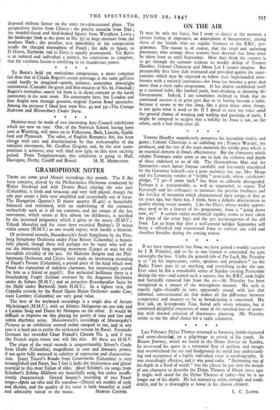GRAMOPHONE NOTES
THERE are some good Mozart recordings this month. The E flat horn concerto, played by the Philharmonia Orchestra conducted by Walter Siisskind and with Dennis Brain playing the solo part (Columbia), is fresh and vivacious and very well played, though the solo part seems a little over amplified and occasionally out of focus. The Hungarian Quartet's D minor quartet (K.421) is beautifully balanced and restrained, with no underlining of the romantic melancholy such as is all too common, and the tempo of the last movement, which seems at first almost too deliberate, is justified by the increased poignancy which it gives to the music (H.M.V.). Yehudi Menuhin and his sister have recorded Brahms's D minor violin sonata (H.M.V.) as one would expect, with hardly a blemish.
Of orchestral records, Shostakovich's Sixth Symphony by the Pitts- burg Symphony Orchestra under Fritz Reiner (Columbia) is beauti- fully played, though there will perhaps not be many who will sit out the immensely long opening movement (Largo) or wait for the incredible triviality of the last. Sir Malcolm Sargent and the Phil- harmonia Orchestra and Choirs have made an interesting recording of Faure's Pavane (Columbia), a period piece of the kind which won Faure the reputation of indolent charmeur, but interestingly scored (by him or a friend or pupil?). For orchestral brilliance there is a breathtaking Vespri Siciliani overture by the Augusteo Orchestra under de Sabata (H.M.V.) and an attractive Rosenkavalier Suite by the Halle under Barbirolli (both H.M.V.). In a lighter vein, the Coppelia records by the Royal Opera House Orchestra under Con stant Lambert (Columbia) are very good value.
The best of the keyboard recordings is a single disc of Arturo Michelangeli (H.M.V.), with an Albeniz Malaguena on one side and a Catalan Song and Dance by Mompou on the other. It would be difficult to improve on this playing for purity of tone and line and subtle rhythmic sense. Moiseiwitsch's recordings of Mussorgsky's Pictures at an exhibition seemed rather unequal to me, and in any case it is hard not to prefer the orchestral version by Ravel. Fernando Germani has recorded Cesar Franck's Chorale No. 3, and if you like French organ music you will like that. All these are H.M.V.
The plum of the vocal records is unquestionably Silveri's Credo from Otello (Columbia), magnificent in tone and dramatic power, if not quite fully matured in subtlety of expression and characterisa- tion. Jenny Tourers Rondo from Cenerentola (Columbia) is very accomplished and fluent, but I feel it lacks the incisiveness and glitter essential to this most Italian of roles. Aksel SchiOtz's six songs from Schubert's Schiine Miillerin are beautifully sung, but rather insuffi- ciently characterised. Gerard Souzay's recording of two Faure songs—Apres un rive and En sourdine—(Decca) are models of style and diction, and the quality of his voice is both beautiful in itself


































 Previous page
Previous page